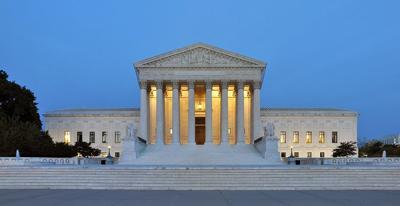
U.S. Supreme Court
A federal judge in Montana dismissed a climate lawsuit last week, marking another defeat for a legal strategy that even its backers admit is a backdoor way of pursuing energy policies they can’t get through the legislative process. A case now being considered by the U.S. Supreme Court may deliver the final blow.
Our Children’s Trust sued to block President Donald Trump’s executive order encouraging the development of fossil fuels and discouraging renewable energy. In an Oct. 15 ruling, U.S. District Judge Dana Christensen reluctantly dismissed the lawsuit, saying the plaintiffs – 22 youths who said their right to a safe environment was at risk -- had made an “unworkable request.”
It is beyond the power of a federal judge “to create environmental policy,” said Christensen, an Obama nominee, because policy is left “for better or worse, to the wisdom and discretion of the executive and legislative branches.”
State and federal judges in New York, California, Maryland, New Jersey, Puerto Rico and elsewhere have made similar rulings in climate cases seeking money from oil companies to pay for the effects of global warming. After a round of early defeats in federal courts, private lawyers who scored contingency-fee contracts from government officials retooled their strategy to focus on state-law nuisance and consumer-protection claims.
Most of the lawsuits claim oil companies misled consumers about the consequences of burning fossil fuels, causing them to buy more than they otherwise would.
The Supreme Court rejected an appeal of one of the most advanced cases, by Honolulu. But it has signaled interest in an appeal of Boulder, Colorado’s lawsuit against ExxonMobil and Suncor. The Trump Administration, Republicans in Congress and attorneys general of more than two dozen states have asked the court to take up the case and decide once and for all that federal law prohibits state courts from extracting damages from oil companies over global warming.
“Cases like this one threaten the availability of affordable energy,” said Alabama AG Steve Marshall in the multistate brief. “There can be no question that Boulder’s billion-dollar carbon tax would damage the efforts of other States to promote affordable and reliable energy.”
The Justice Department, reversing policy under the Biden Administration, also urged the court to take the Boulder case and put an end to state climate lawsuits. The Trump Administration has also sued Hawaii and Michigan to prevent their climate cases.
“After the change in administration, the United States has reexamined its position …and has determined that state-law claims like those alleged here conflict with `the decision-making scheme Congress enacted’ in the Clean Air Act,” the Justice Dept. said.
“Boulder’s common-law claims seek to hold petitioners responsible for all of their fossil-fuel activities, anywhere in the world—extending the reach of Colorado common law well beyond Colorado’s territorial limits.”
Even the promoters of such litigation sometimes admit they are seeking a carbon tax they can’t get through the democratic process. David Bookbinder, a former member of Boulder’s legal team, said in a recent Federalist Society panel discussion that “tort liability is an indirect carbon tax.”
“You sue an oil company, an oil company is liable, the oil company then passes that liability on to people who buy its products,” Bookbinder said. Plaintiffs like Boulder, he said, are saying “we can either tax our local citizens, or we can try to get compensation from the producers.”
Bookbinder also predicted that if one plaintiff wins a case all the way to final judgment, the rest of the oil industry will file for bankruptcy. Oil and gas will still be used, he acknowledged, only at a higher cost and with warning labels that burning gasoline warms the atmosphere.
There are some 33 state and municipal lawsuits pending, mostly making similar claims that consumers have been misled into burning more fuel than they otherwise would. Supreme courts in Hawaii, Massachusetts and Colorado have upheld denials of motions to dismiss, with the Hawaii case furthest along. The Massachusetts lawsuit, filed in 2019, is still mired in pretrial disputes as ExxonMobil tries to force the state to turn over advertising it has collected from other oil companies to prove its marketing was not uniquely misleading for consumers.
Climate plaintiffs have lost in other states including Maryland, where the state supreme court recently heard arguments over the dismissal of Baltimore’s case; and Puerto Rico, where a federal judge dismissed San Juan’s case alleging global warming caused 2017’s Hurricane Maria.
Judges in Pennsylvania, New Jersey, New York and South Carolina also dismissed cases, with Judge Roger Young, Sr. writing about the City of Charleston’s suit: “Under Plaintiff's theory, virtually anyone could be a plaintiff - and a defendant - in what would effectively amount to a perpetual series of lawsuits that reset after every storm."
The U.S. Supreme Court appeared to close the door on climate lawsuits in 2010 with AEP v. Connecticut, dismissing a lawsuit by several states over utility CO2 emissions. In that case, the court unanimously ruled the federal Clean Air Act preempted such claims under federal law, but didn’t explicitly rule out nuisance claims under state law.
Plaintiff lawyers used the court’s silence to craft new lawsuits arguing state courts could still hear lawsuits over global warming, although defendants and the federal government say Congress never intended to leave that loophole open. With the Boulder case, they are hoping the Supreme Court will finally close it.








